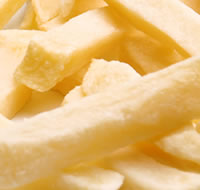The remarkable growth of the Belgian potato-processing sector in the past few decades continued to roll on in 2015. Just under 4 million tons of spuds were transformed into frozen or fresh fries, mashed potato products, crisps, precooked potatoes, flakes and granulate. With 3,970,595 tons of processed potatoes, the sector generated a 4.4% growth rate over 2014.
 What is remarkable in the annual overview of Belgapom, the Belgian association for the potato trade and processing sectors based in Belare, is the continued rise in investment made by its members, as an expenditure of EUR 167,207,415 (+ 44.7%) set a record in 2015. With expansion of the sector still on the horizon in for the next few years, there is little chance that this forward march will slow down any time soon.
What is remarkable in the annual overview of Belgapom, the Belgian association for the potato trade and processing sectors based in Belare, is the continued rise in investment made by its members, as an expenditure of EUR 167,207,415 (+ 44.7%) set a record in 2015. With expansion of the sector still on the horizon in for the next few years, there is little chance that this forward march will slow down any time soon.
The growth is above all apparent in the production of frozen (+5.3%) and fresh fries (+2%), while the volume of other products (such as potato croquettes, crisps and flakes) increased by +1.3%.
After years of increases in the number of jobs sustained by the industry, 2015 seems to have witnessed stagnation, thus confirming ongoing automation in the highly mechanized sector.
This growth of the Belgian potato processing industry reflects rising global demand for value-added potato products. The fact that this nutritious source of carbohydrates, vitamin C and potassium can be grown and harvested with less land and water usage than cereals and rice also makes spuds popular in geographical regions where potatoes were not previously regarded as staple crops.
Potato production in developing countries is rising sharply, as is the demand for user-friendly potato products. Thus at the beginning of 2015, the Chinese government announced that the potato will increasingly replace rice and noodles in meals. This trend is also apparent in India.
The Belgian potato scene is built on a solid foundation that flourishes today with highly efficient farming and processing techniques, in addition to the proliferation of chip shop (frituur) culture at home and abroad. Belgium, which is situated within the highly productive European potato belt that ranges from the United Kingdom to Poland, can count on skilled farmers who produce high-quality tubers well suited for being processed into fries, crisps and other value-added products.
Furthermore, the Belgian potato production chain is made up of numerous family businesses that are active in trade, supply and processing – a dynamism that from November 27-29, 2016, will once again be exhibited during Interpom Primeurs, the international potato trade fair, at Kortrijk XPO.
Together for Sustainable Growth
Growth yields in the Belgian potato sector not only benefit the processing industry, but also ensure that producers and companies providing goods and services can further develop as a cluster. The “Together for Sustainable Growth” project launched by Belgapom is central to this. It is designed to steer the entire potato chain towards further, sustainable growth.
Belgapom has to this end – together with the other partners in the chain and the Belgian research and test centers – committed to projects such as the Reskia (low-residue germination inhibition), Bintje Plus (a multiple phythophthora-resistant Bintje) and Ipot (a web application that can closely follow and adjust the growth of potatoes via satellite).
James Bint has License to Fry
 Belgapom and its companies strive to further develop the image of “real Belgian fries” all over the world. James Bint, a cartoon character with a “license to fry,” will in the coming years remain the global ambassador for Belgian fries. In 2016 a campaign with Belgian chip shops is planned to help consumers get to know the character even better. What’s more, the successful promotion with the chip shop at the Belgian pavilion during the World Fair in Milan last year will carry on with special offers all over the world.
Belgapom and its companies strive to further develop the image of “real Belgian fries” all over the world. James Bint, a cartoon character with a “license to fry,” will in the coming years remain the global ambassador for Belgian fries. In 2016 a campaign with Belgian chip shops is planned to help consumers get to know the character even better. What’s more, the successful promotion with the chip shop at the Belgian pavilion during the World Fair in Milan last year will carry on with special offers all over the world.





